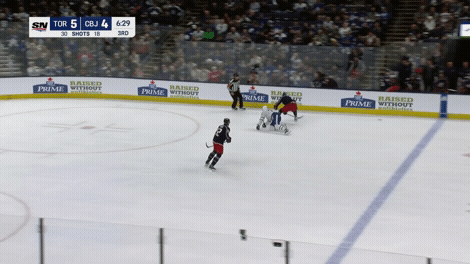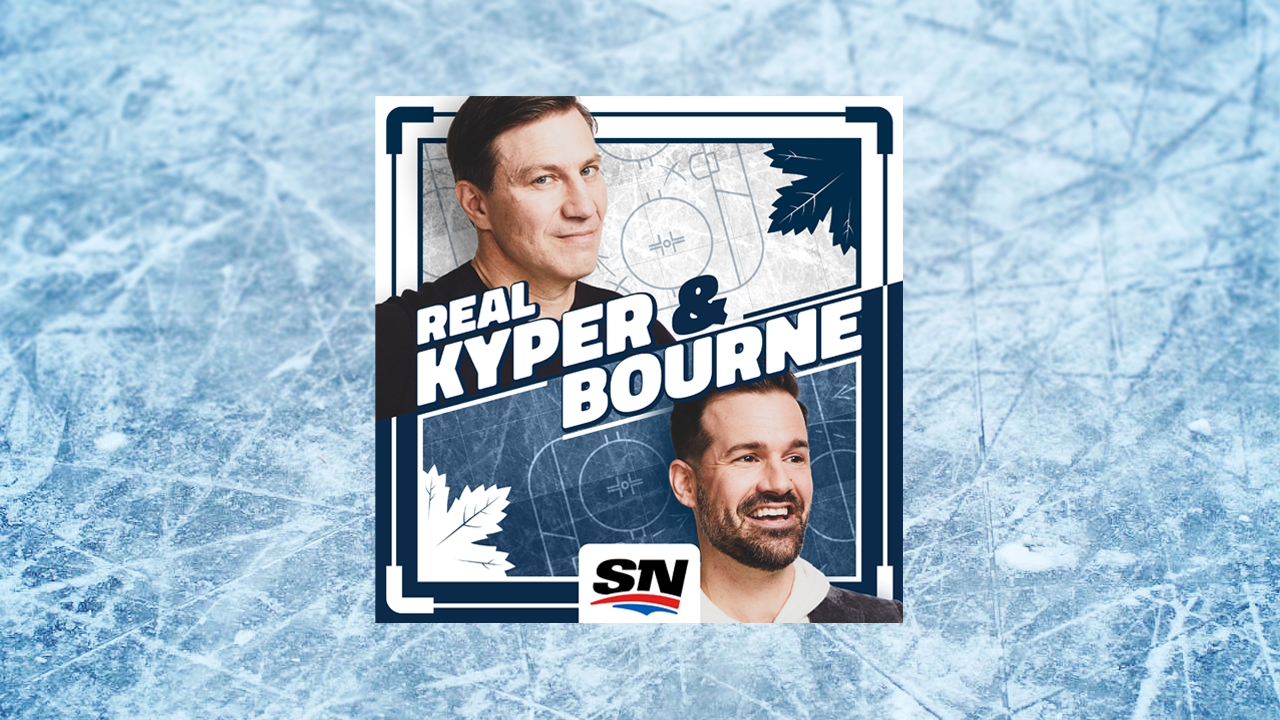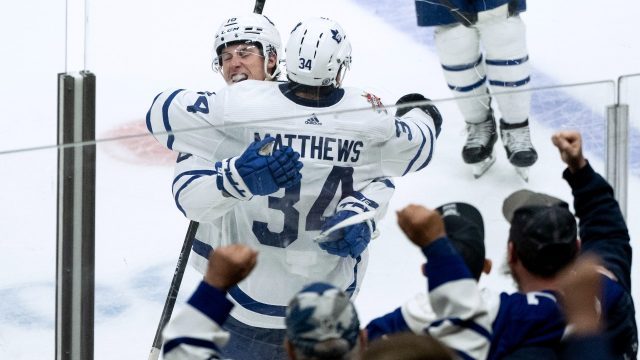
The Toronto Maple Leafs are coming off two of their finest performances of the season, both on the road. One was against a legitimate Cup contender in the Los Angeles Kings, and the other was against the Anaheim Ducks who had a goalie in Lukas Dostal assume the soul of Martin Brodeur for a night.
They showed up in California in a big way, mopped up the four points, and now face two upcoming games against the league’s worst team: The San Jose Sharks.
Things are looking pretty good.
Those two performances followed what was really an unprecedented move from Sheldon Keefe when he healthy scratched one of the few Leafs players who is A) Not a member of its long-time, five-person core, yet is B) a legitimately important member of the team with a long-term contract. Keefe sat David Kampf down after an egregious turnover against the Columbus Blue Jackets last week took the Leafs from up one with possession in the offensive zone to tied with six minutes to go in the third.
It was a rough moment for a guy whose job is centred on defensive responsibility and smart, veteran decision-making.
Of the scratch, Keefe said:
“I guess you could call it a message to the group. There is going to be less tolerance for that. We have to get better in this area. That is it.
In particular, members of our leadership group — as David is — we trust to lead the way for us. The expectations are higher. Kampf, specifically, has to be a leader on that line. He has to be a leader in those types of situations where we are in control of the game.”
Keefe went on to note that it’s not just Kampf, but also the guys who score a lot, who need to be diligent in these areas.
This idea of actually benching a “name” player on your team received mixed reviews from the Leafs faithful. For years some fans have been on Keefe’s case for not holding players accountable enough, but some saw Kampf’s scratch as a half-measure, choosing an “easier” target than one of the team’s bigger names who turn the puck over far more often.
On social media there was plenty of “But what about (Player X)” responses to Keefe’s decision, which showed a bit of a misunderstanding about what the coach is going for here. Given what the Leafs ask from their superstars, healthy scratching any of them would seem a measure well beyond necessary to establish a new standard.
That said, having covered this team closely for years, establishing accountability at the top of the roster has indeed proven to be a challenge. Given the importance of standings points, most nights it hasn’t mattered how the Leafs’ core forwards (Matthews, Nylander, Marner, and Tavares) were playing — if the team needed a goal, they were thrown over the boards to pursue it. The logic has always been simple enough: “Heck, Auston Matthews at 70 per cent is more likely to score than most everyone else at 100 per cent, right?”
That message may not be good for the team’s stars or for those behind them who are pushing every night for a bit more opportunity.
Establishing a new standard is a good thing if it’s applied somewhat consistently, and based on effort and performance in relation to individual expectations.
Over the years, the lack of anything negative at all (including words) coming from the coach against the Core Four simply hasn’t incentivized those players to bring diligence and effort regardless of the opponent. If you’re going to get the high profile, point-getting opportunities in the biggest moments (power plays, late-game pushes, overtime, etc) no matter what you do, then you can afford to lose a tough puck battle or maybe take an offensive chance that isn’t for the betterment of the group.
Frankly, it means those players can be just “meh” against the league’s bottom-feeders and still get ice time as the teams tries to play catch up in the final minutes. We’ve seen them do this many times in 2023-24 while handing away points to lesser clubs. (Though they brought it against Anaheim a few days after Kampf was scratched.)
Accountability can’t just be a one-off policy that only applies to Toronto’s “B” players. That isn’t to say I think Keefe should healthy scratch one of his “A” guys, but I can’t remember a game where any of them had their ice time dialled back for ineffective play. And, let’s be real, nobody delivers their best game in all 82 on the schedule.
If it’s not ice time being dialled back, could we see one of these core “A” players spend a period or two on the third line? I hardly think that would be a crisis, and would be great for the guys who normally play on those lines, including whoever got the opportunity to move up in the lineup.
But here’s what really complicates this idea, and it’s of Toronto’s own making: if you’re going to lean on your core four forwards in all situations, in all games, regardless of their play or the stakes, then how can you possibly bench them when they’re imperfect?
Mitch Marner and Auston Matthews played over 25 minutes against the Anaheim Ducks in the second half of a back-to-back on a Wednesday night in January. Woof. Yes, they were wonderful and deserved minutes in this particular case, but imagine they’re imperfect in an upcoming game (which would be justified given their workload) and then get benched or demoted for being “off” a bit. One would imagine they’d feel pretty frustrated, given how every bit of juice gets squeezed out of them every time the Leafs need a goal — a pretty common occurrence when you go to overtime 15 times in 35 contests.
You can’t drive your car out of gas, then be mad when it stalls out going up the next hill. So, how the Leafs’ “A” players are used has to change before a new standard can logically be applied.
Another complicating factor is that the rules for the Leafs’ Core Four forwards — and this goes for every team, really — are not the same as for the rest of the team. They are allowed to take more chances because of what they create when it works out. William Nylander can fly the zone more than a third line forward can because he’s way more likely to bury any chance that may come. This longer leash has been on clear display for years, so to suddenly claim they’re going to feel the same tightening restrictions as the rest of the group might garner some cloudy dispositions.
Establishing accountability with elite players can be a pickle, and the Leafs have themselves a jar full of them.
Toronto has just handily won a couple games, so it looks like the team was either unfazed or responded well to this new paradigm. But it will be fascinating to watch how strictly the Keefe-led staff wants to adhere to this plan of accountability.
Being a head coach in the NHL today is much more about managing personalities than teaching Xs and Os. Keefe certainly has the talent to win games and they’ve been doing that. But keep an eye on what the ice time is and who the linemates are for the Leafs’ star players the next time they’re having a rough night, and then how they respond. Getting everybody to buy in to a new way of thinking may be the only way for the Maple Leafs to take the next step.








